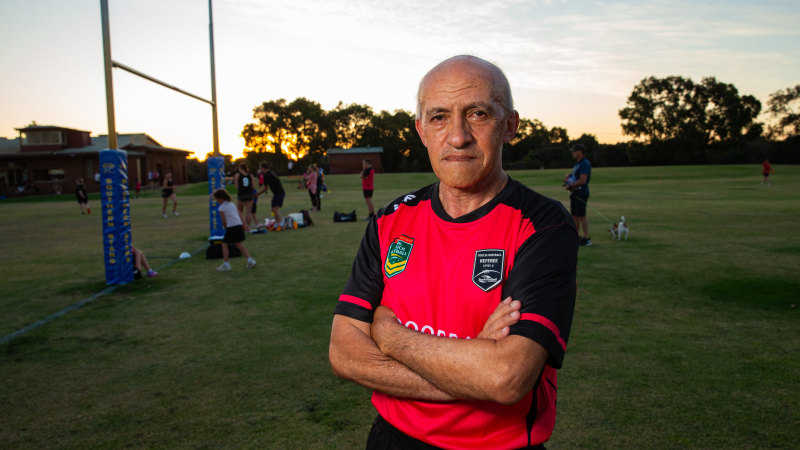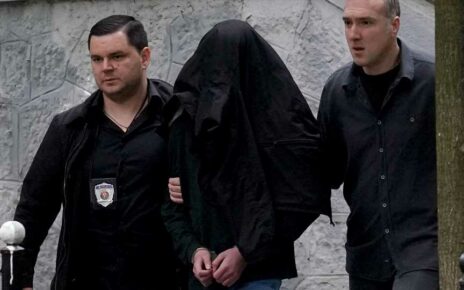Save articles for later
Add articles to your saved list and come back to them any time.
The chance of surviving an out-of-hospital cardiac arrest is one in 10, but Perth man Joe Jeffries has beaten the odds twice in just seven months.
The 64-year-old touch rugby referee collapsed during half-time at separate games – one held at his Southern Stars Touch Football club in Karawara on January 22 this year, and the second at Northern District’s Bennet Park in Doubleview on July 3.
Joe Jeffries said he was lucky to be alive. Credit: Ross Swanborough
Thanks to the quick actions of teammates, who grabbed an automated external defibrillator located at the clubs and commenced CPR, Jeffries regained a pulse before the ambulance arrived both times.
He was told by multiple doctors he was lucky to be alive.
“You just feel so out of control,” he said.
“It was rather concerning that first time, I was out of it for 2½ days, unaware of anything and hooked up to oxygen for 10 days out of the 14 I spent in hospital.
“Then I was discharged, and it was four more weeks before I could walk properly. After that, I did 12 weeks of rehabilitation work.”
Jeffries was then cleared by doctors and said he felt great, but only a few weeks later he collapsed again.
Taken back to the hospital, he said he didn’t remember the first few days, but when he woke up doctors sent him for multiple tests.
“My heart was pumping flat out. Doctors have told me that, in simple terms, my bain was saying I needed more oxygen, but my heart was saying, ‘No you don’t’,” he said.
Former Australian Army medic and Southern Stars head trainer Paul Hudson saw Jeffries collapse at the first game and began chest compressions right away while sending for a defibrillator.
The St John First Responder App
The app sends your GPS coordinates to the operator when you call triple zero for an ambulance, and also provides access to vital information such as:
- A defibrillator locator
- A first aid instruction guide
- The nearest medical centres and emergency departments
- Patient tansport services information
- First aid course information and refresher notifications
- Real time updates on emergency department waiting times
It also allows qualified first aiders in WA to sign up and become a registered first responder. If a nearby emergency occurs (in a public place within 500 meters), they will be notified and given the opportunity to assist until the ambulance arrives.
“If you don’t get the heart moving, the blood starts to clot and the heart swells to a third more than its usual size which can interfere in moving the blood to vital organs and hinder a shockable rhythm,” Hudson said.
“Early intervention with an AED and significant chest compressions within the first minutes of witnessed cardiac arrest will significantly improve the odds of survival.”
Northern Districts vice president Jake Bogue, who did a year study of paramedicine and works in health care, was at both games when Jeffries fell unconscious and stopped breathing.
During the second incident, it took at least five minutes for the first shock from the defibrillator to be delivered because it was further away and there was a slight delay because the automated device wouldn’t send a shock while hands were still on Jeffries’ chest doing compressions.
But despite the delays, Jeffries’ pulse returned.
“We were very happy with our efforts, there was a huge sigh of relief for everyone with that one,” Bogue said.
Jeffries has just completed his second round of rehabilitation, but has more tests and follow-up appointments to come, to make sure his body is recovering. He is now coaching touch rugby full time and not taking part in the games while he waits.
He said he was thankful for the quick work of those who came to his aid and for the fact both clubs had defibrillators.
St John WA chief preventative officer Megs O’Donnell said for every minute lost during an out-of-hospital cardiac arrest, the chance of survival dropped 10 per cent.
“There are more than 7700 AED’s registered with St John WA which can be deployed by any member of the public,” O’Donnell said.
“They’re simple and easy to use, which is important because the first few minutes after cardiac arrest are the most critical.
“The only way to make things worse with an AED is not to use it.”
Start the day with a summary of the day’s most important and interesting stories, analysis and insights. Sign up for our Morning Edition newsletter.
Most Viewed in National
From our partners
Source: Read Full Article


